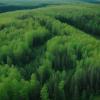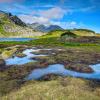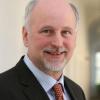
IIASA is proud to announce that no less than 32 researchers and alumni affiliated with the institute have been included in the 2023 Research.com Top Scientists ranking in various areas of expertise.
Research.com, a data-driven platform for scientists that uses machine learning and big data analytics, compiles annual rankings of the best scholars in a variety of academic areas. The areas in which IIASA scientists achieved recognition include biology and biochemistry, Earth science, ecology and evolution, engineering and technology, environmental sciences, and social sciences and humanities. Two IIASA affiliated researchers were also included in the category for rising stars.
The rankings are formulated through a meticulous evaluation of thousands of profiles on Google Scholar and Microsoft Academic Graph. The most recent rankings were compiled using bibliometric data gathered on 21 December 2022. This data was consolidated from various academic sources and citation-based metrics. Additional factors considered for the rankings include the frequency of scholarly publications within a specific field of study, as well as the scholars' notable awards and accomplishments.
The following IIASA researchers and alumni made the list, with some included in more than one area:
Biology and biochemistry:
Keywan Riahi, Energy, Climate, and Environment Program Director
Earth science:
Yoshihide Wada, Principal Research Scholar in Biodiversity and Natural Resources Program. Wada was also recognized as a rising star.
Ecology and evolution:
Ulf Dieckmann, Principal Research Scholar in the Advancing Systems Analysis Program
Michael Obersteiner, Principal Research Scholar in the Advancing Systems Analysis Program
Petr Havlík, Biodiversity and Natural Resources Program Director
Anatoly Shvidenko, Guest Emeritus Research Scholar in the Biodiversity and Natural Resources Program
Piero Visconti, Research Group Leader and Senior Research Scholar in the Biodiversity and Natural Resources Program
Wilfried Winiwarter, Senior Research Scholar in the Energy, Climate, and Environment Program
Engineering and technology:
Linda See, Senior Research Scholar in the Advancing Systems Analysis Program
Environmental sciences:
Keywan Riahi, Energy, Climate, and Environment Program Director
Zbigniew Klimont, Research Group Leader and Principal Research Scholar in the Energy, Climate, and Environment Program
Markus Amann, former IIASA Program Director
Steffen Fritz, Strategic Initiatives Program Director
Nebojsa Nakicenovic, Emeritus Research Scholar in the Energy, Climate, and Environment Program
Volker Krey, Research Group Leader and Principal Research Scholar in the Energy, Climate, and Environment Program
Janusz Cofala, IIASA alumnus
Ian McCallum, Research Group Leader and Principal Research Scholar in the Advancing Systems Analysis Program
Marijn van der Velde, IIASA alumnus
Hugo Valin, IIASA alumnus. Valin was also recognized as a rising star.
Günther Fischer, Emeritus Research Scholar in the Biodiversity and Natural Resources Program
Simon Langan, Senior Guest Research Scholar in the Biodiversity and Natural Resources Program
Florian Kraxner, Research Group Leader and Senior Research Scholar in the Biodiversity and Natural Resources Program
Maximillian Posch, Guest Research Scholar in the Energy, Climate and Environment Program
Chris Heyes, Emeritus Research Scholar in the Energy, Climate, and Environment Program
Pallav Purohit, Senior Research Scholar in the Energy, Climate, and Environment Program
Reinhard Mechler, Research Group Leader and Principal Research Scholar in the Advancing Systems Analysis Program
Fabian Wagner, Capacity Development and Academic Training Unit Dean and Principal Research Scholar in the Energy, Climate and Environment Program
Christian Folberth, Research Scholar in the Biodiversity and Natural Resources Program
Sten Nilsson, Guest Senior Research Scholar in the Biodiversity and Natural Resources Program
Dmitry Schepaschenko, Senior Research Scholar in the Advancing Systems Analysis and Biodiversity and Natural Resources programs
Social sciences and humanities:
Shonali Pachauri, Research Group Leader and Principal Research Scholar in the Energy, Climate, and Environment Program
Sabine Fuß, Guest Research Scholar in the Biodiversity and Natural Resources Program
Michael Thompson, Guest Emeritus Research Scholar in the Advancing Systems Analysis Program
“It is very reassuring that IIASA is doing so well in this as well as in other recent rankings. For its comparatively small size it seems to have great impact. This is even more significant in light of the inter-disciplinary and trans-disciplinary nature of IIASA research that is typically more difficult to place in good journals than strictly disciplinary research,” concludes IIASA Interim Deputy Director General for Science, Wolfgang Lutz.
Further information
https://research.com/
News

26 July 2024
Navigating new horizons to protect human and planetary health

17 July 2024
Forests endure as carbon sink despite regional pressures

01 July 2024
